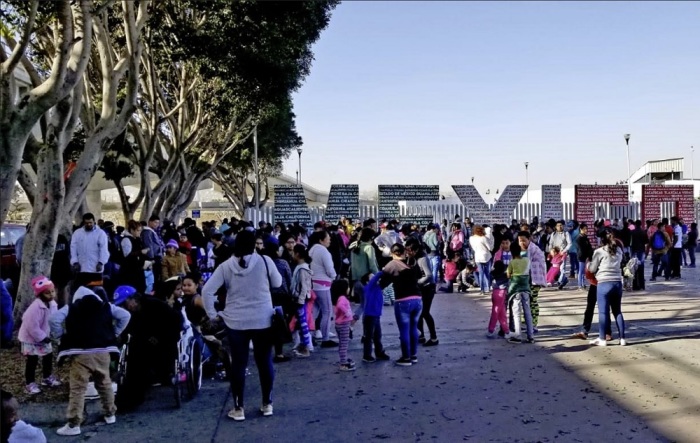Faith groups speak out on Supreme Court allowing temporary enforcement of Trump asylum rule

Some Christian leaders and humanitarian groups are condemning the U.S. Supreme Court’s decision to temporarily allow enforcement of a new rule that would prevent many immigrants traveling through Central America from seeking asylum at the U.S. southern border.
The justices lifted a California federal court’s injunction against the new asylum policy announced by the Trump administration in July that would make nearly all immigrants who pass through another country on their way to the U.S. border without first seeking asylum in those countries ineligible for asylum in the U.S.
“BIG United States Supreme Court WIN for the Border on Asylum!” President Donald Trump tweeted Wednesday evening.
According to The Associated Press, the Trump administration put the new rule into effect Thursday and aims to close the gap between an initial asylum screening process that most people pass and a final asylum decision that most people do not win.
Attorney General William Barr has contended that the new rule will reduce “burdens” related to processing and apprehending hundreds of thousands of immigrants who come to the border. In January, Trump declared a national emergency in response to what the administration says is a “border security and humanitarian crisis.”
The Supreme Court didn’t rule on the merit of the rule’s legality but only allowed the rule to go into effect until the case is adjudicated.
Justices Ruth Bader Ginsburg and Sonia Sotomayor dissented from the order.
“Once again the Executive Branch has issued a rule that seeks to upend longstanding practices regarding refugees who seek shelter from persecution,” the dissent, written by Sotomayor, reads.
“Although this Nation has long kept its doors open to refugees — and although the stakes for asylum seekers could not be higher — the Government implemented its rule without first providing the public notice and inviting the public input generally required by law.”
The high court order troubled faith leaders and activists who opposed the rule on grounds that it would make it more difficult for people fleeing violence to use the U.S. legal system to request refuge.
While thousands of Central Americans are making a treacherous journey to the U.S. in hopes of receiving asylum, the ruling comes as there has been an influx in migrants from Africa and Asia coming to the U.S. border.
“I'm so deeply grieved by the Supreme Court decision allowing this policy to go into effect throughout the border,” tweeted Matthew Soerens, national coordinator of the Evangelical Immigration Table and director of U.S. church mobilization for World Relief.
“People trying desperately to go through our complex legal processes to request protection simply can't win, because we keep changing the rules.”
Soerens argues that the rule goes “well beyond addressing illegal immigration.”
“It stops thousands who've not broken any US law, who've waited for months to present their case for why they qualify under US law for protection because they have fled persecution,” he added.
According to SCOTUS Blog, Barr said the new rule creates a variety of exceptions such as in the cases of victims of human trafficking and refugees who have traveled through countries where protection is not available.
In July, World Relief, one of nine organizations authorized to resettle refugees in the U.S. and the humanitarian arm of the National Association of Evangelicals, condemned the rule.
At the time, World Relief President Arbeiter insisted that many immigrants from Central America, Southern America and Africa had waited for months in Mexico just to register their claim at a U.S. port of entry. But because of the new rule, he contended, many of those immigrants will be ineligible for asylum in the U.S.
“The U.S. has a moral obligation to respect our laws that offer protection to those with a credible claim of persecution, and we must not betray that commitment,” Arbeiter said in a statement.
While some might wonder why immigrants can’t seek asylum in Mexico since they are there waiting to enter the U.S., Soerens explained that Mexico “has almost no capacity to adjudicate asylum requests.”
“Its asylum office budget is [less than] $2 million,” he wrote. “So the requirement to request and be denied asylum in Mexico is basically a bureaucratic blackhole.”
The Supreme Court’s ruling was also criticized by the leader of the Church World Service, another organization authorized to resettle refugees in the U.S.
“It is clear that this administration does not consider moral or legal obligations when making decisions. It is time for Congress to step in and hold the administration accountable to terminate the asylum ban,” CWS President John L. McCullough said in a statement.
Avril Benoît, head of the international humanitarian nongovernmental organization Doctors Without Borders, argued that the Supreme Court’s order will be “devastating” to the thousands seeking safety in the U.S.
“Asylum saves lives,” Benoît stressed. “It is not a legal loophole or a way to game the immigration system. It exists because for some people, home is a death sentence. This new policy abandons all asylum seekers and forces people back to danger, violence, and death. This is an inhumane choice that plays with people's lives and upends all existing domestic and international refugee laws around the right to seek asylum.”
Follow Samuel Smith on Twitter: @IamSamSmith
or Facebook: SamuelSmithCP





























